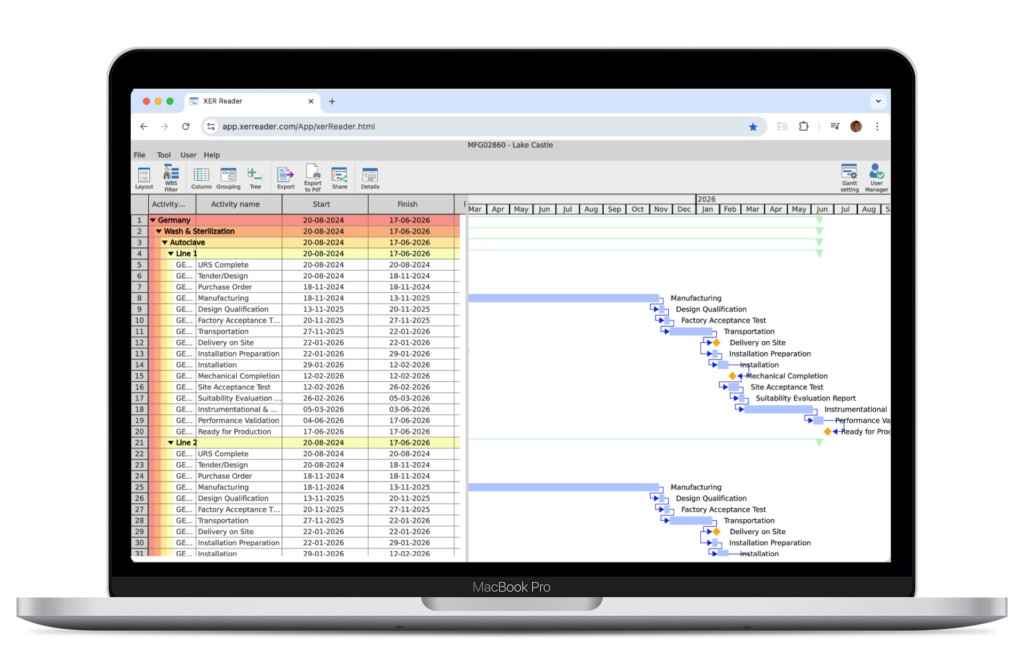


Discover how P6 project management streamlines planning, scheduling, and execution for large-scale projects across industries.
June 26, 2025 – Søborg, Denmark — In an era where delivering large-scale projects on time and within budget is more important than ever, companies are increasingly turning to Oracle’s Primavera P6 to improve project control, scheduling, and risk mitigation. But many professionals and organizations still ask: How does P6 project management work, and why is it considered the industry standard?
Primavera P6 is a comprehensive, high-performance project portfolio management (PPM) software developed by Oracle. It is designed to handle the demands of highly complex projects across industries such as construction, engineering, energy, defense, and manufacturing. P6 allows project managers and stakeholders to manage multiple projects simultaneously while ensuring accountability, visibility, and real-time data access.
At the heart of P6 is its ability to create logic-driven, dynamic schedules using the Critical Path Method (CPM). Users can break down projects into thousands of individual tasks, assign logical relationships between them, and determine the sequence and duration of each activity.
So, how does P6 project management work in practice? It begins by defining the scope of a project and creating a Work Breakdown Structure (WBS). From there, users define each task or activity, assign durations, establish dependencies (predecessors and successors), and allocate resources (such as labor, equipment, and materials). The system automatically calculates the critical path—the sequence of tasks that determines the project’s shortest possible duration—allowing managers to focus on what’s most time-sensitive.
This approach not only offers granular control over each element of the project but also ensures accurate forecasting and proactive planning.
Primavera P6 was designed with enterprise scalability in mind. Unlike many traditional project management tools, P6 can manage hundreds of projects concurrently, making it ideal for organizations overseeing large portfolios.
It also supports multi-user access, enabling collaboration across departments, subcontractors, and clients. User roles and permissions can be tailored to protect sensitive information while still maintaining transparency and communication throughout the team.
Oracle’s Primavera P6 is packed with powerful features that go beyond simple scheduling:
Resource Management: Assign and monitor labor, equipment, and material usage in real time to avoid over-allocation and bottlenecks.
Cost Management: Track actual vs. planned costs, apply rate tables, and integrate with financial systems for real-time budget control.
Baseline Comparison: Set project baselines to measure performance across the lifecycle and assess variances at any stage.
Risk and Issue Tracking: Use risk scoring tools and what-if analysis to model delays and plan mitigation strategies.
Integrated Reporting and Dashboards: Generate customizable reports and dashboards for stakeholders, clients, and executives to quickly understand progress, risks, and KPIs.
Global Accessibility: Primavera P6 is available in both web-based and desktop versions, allowing access from anywhere in the world.
Primavera P6 is widely adopted in industries where delays and cost overruns can result in significant losses or legal consequences:
Construction: Track timelines for multi-phase projects, coordinate subcontractors, and ensure materials and inspections are delivered on time.
Oil & Gas: Plan complex operations with hundreds of moving parts across global sites while maintaining compliance with safety and environmental regulations.
Aerospace & Defense: Manage strict timelines and budgets for classified or high-stakes government projects.
Utilities & Infrastructure: Oversee long-term maintenance and expansion programs for power plants, transportation networks, and urban development.
As demand for skilled P6 professionals grows, many project managers are seeking Primavera P6 training and certification. These programs, available online and in person, teach users how to navigate the software’s interface, develop project schedules, perform updates, run reports, and manage portfolios.
Oracle also offers its own certification program, which helps individuals demonstrate their expertise to employers or clients. Knowledge of how P6 project management works is now a requirement in many job postings across industries.
Organizations that effectively implement Primavera P6 report significant improvements in productivity, cost control, and stakeholder confidence. By creating detailed, dynamic schedules and tracking every element of the project lifecycle, P6 minimizes surprises and maximizes foresight.
“In today’s climate, there is little room for error on high-value projects,” said Karen Mitchell, Senior Project Director at GlobalBuild Inc. “Primavera P6 allows us to stay ahead of problems, not just react to them. Understanding how P6 project management works gives our teams the ability to deliver faster, smarter, and more predictably.”
So, how does P6 project management work? It works by transforming massive amounts of project data into a clear, actionable roadmap—empowering teams to align resources, manage time, and achieve success with confidence.
Whether you’re managing a $50 million bridge project or rolling out infrastructure across multiple continents, Primavera P6 delivers the precision and reliability needed to ensure every detail is accounted for.
About Oracle Primavera P6:
Primavera P6 is Oracle’s flagship project portfolio management software, used by thousands of organizations worldwide to plan, schedule, and control complex projects. Designed for performance and flexibility, P6 is the tool of choice for professionals who demand excellence in project execution.
Media Contact:
XER Reader
Mail ID [email protected]
Websites- https://xerreader.com/
